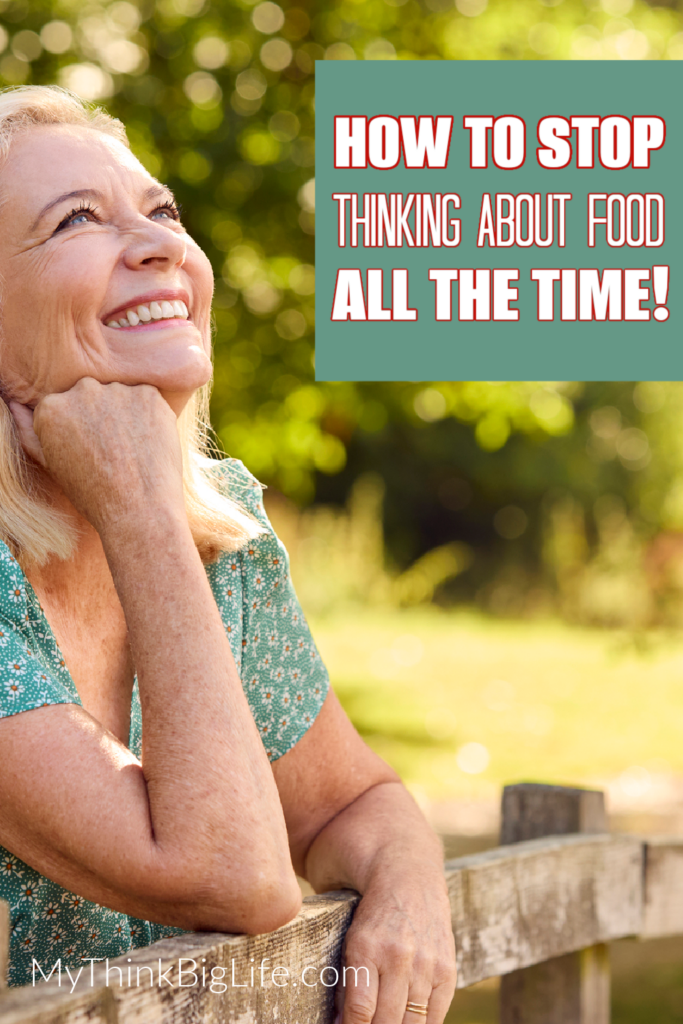How to Stop Thinking About Food All the Time
In my experience, dieting just leads to more food obsession, not less! It’s time to try something different. I teach women to stop thinking about food all the time, so they can, not just lose weight but enjoy their life as well.
Here’s the good news. It is possible to stop thinking about food all the time. I’ve been working with women in private coaching for four years and at this point, I know that you can change even ingrained habits and beliefs about food.
Ten years ago, I didn’t believe you could lose weight after 50. That seems crazy to me now but that’s where my head was. Then I did, so I knew my belief was not true.
In the past four years I’ve been helping other women figure out how to lose weight. I go into a lot of detail in this post on the process.
Is It Possible to Not Think About Food All the Time?
One of the things that is an obstacle to losing weight is that we are obsessed with food. We think about it all the time!
Does any of this sound familiar?
- Unbearable cravings in the evening
- Urges to snack all day long
- Agonizing over things you ate
- Always thinking about and dreading your next diet
- Hating yourself because you don’t have enough willpower
- Frustrated that nothing seems to work
- Thinking the only way to lose weight is to eat food you don’t like and give up all your favorites
- Unable to resist certain foods
- Fear of social situations
- Using upcoming special occasions (weddings, reunions, vacations) as a reason to try and restrict and being mad at yourself when you can’t
That list contains some of the big pain points women share with me. We literally feel at the mercy of our thoughts and feelings about food.
How we think about food makes us absolutely miserable. I cannot overstate how amazing it feels to not be obsessed with thoughts about food all the time.
It feels liberating, calm, peaceful, and joyful to be free from thinking about food all the time.
This is possible and an essential component of any real weight loss journey. I don’t believe in quick fixes, and I want my clients to not just change the way they think. I want them to have a different kind of brain when they are done.
Losing weight isn’t going to solve all your problems and if you haven’t done the mindset work to get to a comfortable weight, you probably aren’t going to enjoy it for long.

The Five Steps to Stop Thinking About Food All the Time
In this post, I’m going to walk you through the steps of how to stop thinking about food all the time. These steps are the foundation to not overeating as well and ultimately put women back in charge of their eating.
In my experience, changing your mindset about food will not lead to weight gain. Ideally, you will stop gaining and then maintain or lose weight.
Commit to not dieting
Eat enough
Increase nutrition
Plan for treats the right way
Understand your own emotional eating patterns
Here are just some of the things clients have told me:
I don’t obsess about food anymore
I’m not snacking at night!
My daughter made cookies–and I just ate one
I didn’t have any “I don’t care” eating
I stayed in control
Didn’t worry or stress. No guilt
I had a rough week and didn’t go for food
I feel super in-control, calm, and confident
I know it might be hard to believe, but you absolutely can stop thinking about food all the time! Here’s the basics of how to not obsess about food anymore.
Commit to Not Dieting
This is harder than it sounds. We are so conditioned to always be thinking about our next diet.
One of the things I love about life coaching is hearing about my client’s enjoyment of food. For example, this week, I had two of my clients who had enjoyed cake and pie at social events.
They had no drama. They didn’t beat themselves up. They chose to have something delicious that was a treat.
And they both still lost weight this week!
I believe that most diets increase our obsession with food. Right out of the gate, diets have you eliminate a whole bunch of foods, reduce portion sizes, and usually have a lot of rules.
Many diets even tell you that if you “mess up” you have to start over. If you ever see those words, I would run. That kind of thinking is part of the problem.
Diets go right to action without taking into account your current habits, likes, dislikes, hunger cues, activity, problem eating, your work, or your family life.
Diets say do this no matter what your situation is. Diets tell you to white knuckle it through parties, dinners out, and other situations.
Diets say you need to eat one way to lose weight and then magically you are supposed to eat your favorite foods later without consequences.
Well, this is probably not a surprise, but every person is different. We all have different needs and we are all grappling with our own challenges and life situations.
You can absolutely eat foods you like and skip the diet foods and lose weight and feel better.
Eat Enough Food at Meals
Diet mentality has everyone skimping on their meals, measuring small portions, cutting out fat, or worse, not eating meals and grazing instead.
I believe a lot of food chatter would go away by women simply eating enough at their meals. My clients are amazed at how much they quit obsessing about food when they actually eat enough at their meals.
Yes, I know. A lot of overeating is done even when a person isn’t hungry.
Yet, in 100% of the women I work with, snacking, overeating between meals and at night, and compulsive eating is eliminated only when meals are filling and satisfying enough.
In my experience, two or three meals placed several hours apart, with a long break from evening until the next day sets the foundation for a healthier relationship with food.
Honestly, we were not designed to snack all the time. Our bodies do really well, with limited eating times.
I’m not saying gorge on your meals or eat a bunch of junk or fast food. I am recommending eating a filling meal of protein, veggies, and healthy fats. Can’t go wrong there. Sprinkle in or add some fruit, nuts, grains, or dairy for a little extra if you want.
If you commit to doing meals, you will find life gets easier. Snacking is a pain because you are never quite satisfied, and it messes with knowing your hunger cues.
Increase Your Nutrition
I recommend getting your eating corralled into meals. This simplifies so many things, especially understanding when you are hungry and not.
After meals are a normal part of your day, it can feel much more doable to increase your nutrition.
What most women realize while tracking the food they eat, is that they have some gaps in their nutrition.
After years of depending on fillers like bread and pasta, it can feel challenging to figure out what to eat instead.
Our bodies require protein, carbohydrates, and fats. These are the building blocks of what we eat. Most women need more of protein and nutritious fats and need a better quality of carbohydrates.
Carbohydrates are not bad. We need them. The problem is that most of us have been relying on non-nutritious carbs and eating way too much of them.
So, to increase nutrition naturally, cut back on highly processed and junk food. Start adding in more vegetables, proteins, and healthy fats.
You will feel better.
Plan for treats the right way
Most women can tolerate some treats every week. Since everybody is different, I can’t give you an exact amount. Some women have to cut them out for the most part. Other women can have some daily.
Here are some general tips:
Have your treat at mealtime. This means, eat your lunch or dinner, and have your treat as part of the meal. This helps because you will be full and will be satisfied with a smaller amount.
Don’t eat crappy treats. Skip the stale candy or crackers or what a coworker left in the kitchen to get rid of.
Plan for special occasions. If wedding cake is one of your favorite treats—plan to have a piece and enjoy it thoroughly.
Have the ice-cream, cake, or pie that is really special. Make it your choice and don’t spend a single moment beating yourself up about it.
Understand your own emotional eating patterns
Anytime you eat for something besides hunger, you are eating for an emotional reason.
This is the reason I usually recommend women eat more. Just this week, one of my clients was amazed that she was eating more and losing weight. A couple of weeks ago a client sent me a picture of her at her goal weight. In talking, she was also amazed that she was eating more now after losing 25 pounds than she had when she was dieting and couldn’t lose a pound.
Most women really don’t eat enough good food at their meals.
So, to begin to tackle emotional eating, we have to remove the hunger that comes from eating too little or processed food that leaves us more hungry later.
Hunger is not a bad thing!
Hunger tells us when it’s time to eat.
When we have had a filling meal, our hunger will come on gradually and feel good. Hunger of this type is a beautiful thing. It is your body doing what your body is supposed to be doing.
What I’ve learned is most women don’t overeat all the time. They usually have their trouble times such as eating at night or snacking throughout the workday.
It’s important to understand why you overeat when you do. It usually has some component of “this is the only way I can deal with my life.”
Women often overeat or eat crap because it helps them cope with some aspect of their life. It makes life bearable in some way.
This is why it rarely works to just remove the problem food. Without understanding the why you are eating when you aren’t hungry; it’s hard to make a sustainable change. Knowing the why helps you address things that maybe you don’t want to address.
Addressing the reasons you are overeating at times, does not mean you have to make big changes in your life. Often, it’s a mindset change required. When you think about things differently, you feel different.
When you feel different, you can act different. This is how you finally make permanent changes to how you think about food.
What Happens When You Stop Thinking About Food All the Time?
I love it when my clients tell me that not only are they not engaging in their former problem eating, they literally never think about it again.
Turning off the mind chatter about food feels incredible. Living life without obsessing about food is the ultimate freedom.
It’s freedom to know you can eat anything you want and that you are able to choose what is best for you at any given time.
When you aren’t thinking about food all the time, your brain can be put to better use. All of life becomes better because no you can focus on things that are truly important.
By not obsessing about food all the time, you can give your attention to what matters for you. Women usually improve their relationships, their careers, and their leisure life because of this.
Not obsessing about food isn’t just about losing weight; it’s about losing the things that have been holding you back or keeping you stuck.
If you need more help and want one-on-one help; then schedule a zoom consult here.
Keep showing up my friends,
Sara
Ready to find out more?
Schedule a free consultation today.
Coach with Me!

Hi, I'm Sara Garska and I'm so happy you're here! Big changes can happen with a shift in thinking. Over time, you transform your life into the one you always dreamed of having. As a certified life coach, I can help you create a life you love. Visit my life coaching page here.
